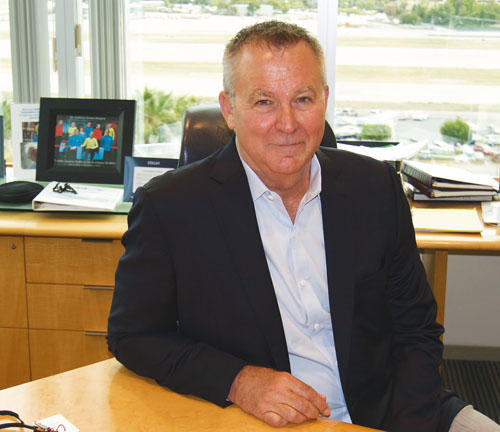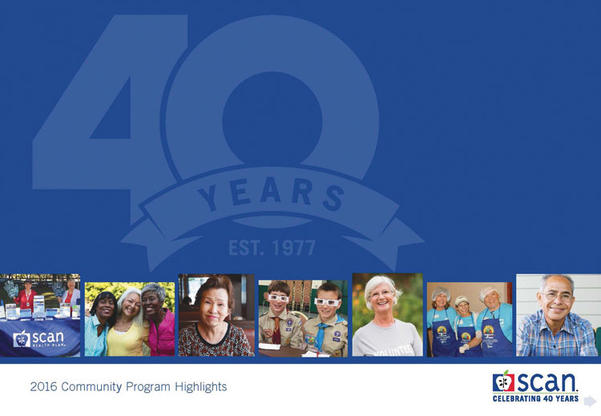In 1977, 12 Long Beach senior citizens who were unhappy with the number of their friends and family members placed in nursing homes came together to form a solution – the Senior Care Action Network. Over time, the nonprofit organization’s services have evolved, but its mission has remained the same: “Keeping Seniors Healthy and Independent.”
Now known as SCAN Health Plan, the organization remains headquartered in Long Beach, where the majority of its 1,070 employees are located, according to CEO Chris Wing. The organization serves 14 counties throughout California, offering Medicare Advantage plans.

Chris Wing became CEO of SCAN Health Plan in 2011. Since then, he has led the nonprofit organization out of some financial difficulties, overseen its expansion and championed the growth of its Independence at Home program. (Photograph by the Business Journal’s Larry Duncan)
Before coming on as CEO in 2011, Wing served as COO of Healthcare Partners for six years. “I have always held SCAN in high regard. It has got a tremendous mission,” Wing told the Business Journal in an interview at the organization’s headquarters.
Wing reflected, “The biggest asset SCAN has on our balance sheet is trust, because we have had the same mission statement for 40 years.”
Forty years ago, the seniors who formed SCAN were affiliated with the City of Long Beach, St. Mary Medical Center and the Department of Aging, Wing noted. “We started with a small little contract just keeping seniors out of nursing homes,” he said.
In 1982, Congress awarded SCAN a social HMO contract, which became its focus until the federal program ended. “When that went away, we became a Medicare Advantage Plan. I think we are now the fifth-largest not-for-profit Medicare Advantage plan in the country,” Wing said.
SCAN’s first service, Independence at Home (IAH), still operates today. The division provides free home care, care management and planning, health education and other services through a variety of programs to Californians whether they are members of SCAN or not.
When Wing first came on board with SCAN, he was impressed with IAH’s program that transitions seniors living in care facilities back into their own homes. He noted that his own father lived out his last years in a nursing home, a place he soberly said he “will always remember the sights and smells of.”
In 2013, Wing brought the head of the division to speak to SCAN’s board, which in turn granted IAH an additional $5 million in funding, thereby growing the program. Now, IAH’s overall budget is $11.6 million.

“When we identify folks who can benefit from our program, first we make sure that they don’t have resources available,” Dr. Romilla Batra, SCAN’s chief medical officer, told the Business Journal. “We truly kind of want to offer it to people who need it and there are no other programs for them to go to.”
SCAN is consistently rated second only to Kaiser Permanente by the Centers for Medicare & Medicaid Services’ (CMS) Five-Star Quality Rating System, according to Wing.
SCAN also measures itself against other Medicare providers by comparing net promoter scores, which reflect customer satisfaction. “Kaiser is again best of class. They had a fantastic net promoter score of 72,” Wing said. “We came in at 69. Those are both fantastic scores.”
In 2016, SCAN measured its net promoter score against those of Kaiser, Aetna, United, Humana and Anthem. Kaiser again came in at 72 and SCAN at 69. “Of those we assessed, the next closest was 44. Two were tied at 30, and one was at 15,” he said.
“We’re doing great when it comes to customer satisfaction,” Wing said. “I think the last three years we were the fastest-growing Medicare Advantage plan in California as measured by percentage growth.”
There have been bumps along the way, however. In 2008, SCAN began offering plans in Arizona. But SCAN’s market share was small, and it did not have a “winning strategy,” according to Wing. SCAN officially exited the Arizona market at the start of 2016.
SCAN was having some difficulties in California as well when Wing came on in 2011. “When I got here, Medicare Advantage growth was just going through the roof, and we were losing market share,” Wing said. “And that’s not a track record or trend line that leads to success.”
To address this issue, SCAN made changes in leadership, even bringing experts out of retirement to help reposition the organization, according to Wing.
At the time, the company had not been using brokers to sell its plans, instead selling them in-house. Medicare plans have an annual election or enrollment period of about 60 days. For that reason, it made more sense to Wing to use brokers so the organization could flex its sales staff during busy periods. “So we opened up the broker distribution channel and started developing trusting relationships with brokers,” he said.
Looking To The Future
About half of the people SCAN serves are healthy seniors – those with one or no chronic condition. Thirty percent of seniors served by SCAN have two to three chronic conditions and are categorized as “the well-managed chronically ill,” Wing said. The organization’s frail beneficiaries make up 20% of its served population and have four or more chronic conditions.
Eight percent of the healthiest senior population has a clinical diagnosis of depression, while 28% of the well-managed chronically ill and 48% of the frail have this diagnosis, Wing noted. “The question we’re always asking ourselves is: are they depressed because they have all these chronic conditions, or do they have all these chronic conditions because they are depressed?” he said. “I’m sure there’s a little of both.”
Wing said that overall, the medical field does not do a good job when it comes to delivering health care to frail seniors, those who are homebound, and those who are coping with mental health issues. “There is a problem with diagnosis, there is a problem with treatment. So we’re really looking to close these gaps,” he said.
SCAN has about $500 million in cash reserves, a conservative stockpile that Wing pointed out could provide opportunities to address gaps in care.
“We have actually been searching out companies that have promising technologies for behavioral health,” Wing said. SCAN has entered into a nondisclosure agreement with a firm to pilot technology that would allow primary care physicians to connect with mental health providers when they are seeing an elderly patient they feel may need a mental health assessment.
“They install iPads in the primary care physician’s office, and when the primary care physician is expecting that there might be a diagnosis of depression or cognitive impairment, they call or they Skype an intake number,” Wing explained. “The intake person is usually a nurse practitioner and will usually talk to the patient and kind of assess is this a medical issue or is it really a behavioral/social/psychological issue, because medical doctors have a hard time diagnosing behavioral, social, mental issues.”
To kick off its 40th anniversary celebration, SCAN held a colloquium in April in partnership with California State University, Long Beach (CSULB) and the City of Long Beach. The event addressed health and wellness issues among seniors with a focus on a community approach to care. Moving forward, Wing hopes to expand upon these partnerships.
SCAN has already begun to grow ties with CSULB. In honor of its 40th anniversary, the health plan provider donated $40,000 to the university’s College of Health & Human Services in mid-April.

CSULB is developing a curriculum to have students and professors assess which of SCAN’s home-care programs are making a difference. “We’re a not-for-profit. When we identify something that works, we want to publish it,” Wing said. “There are 54 million seniors across the country, and they are a drain on the federal budget because they are not getting good, cost-effective care. . . . So if this stuff works, we want to share it from the highest rooftop.”
On The Health Care Industry And The Outlook For SCAN
“I think the biggest problem facing the health care industry is the uncertainty that’s due to the partisan politics in D.C.,” Wing said.
“The American Health Care Act (AHCA) creates a lot of uncertainty for the exchanges, a lot of uncertainty for Medicaid,” Wing said. “I am really very disappointed in this because I think it basically just got turfed, if you will, from Congress to the Senate, because Congress wants to be able to go home and say, ‘We did our best to get rid of Obamacare,’” he continued, referring to the passage of the AHCA by the U.S. House of Representatives. “It’s like they just washed their hands of it.”
While Wing said he did not like the partisan politics of the Affordable Care Act, he approves of some of its outcomes. “It has changed the orientation from a volume-based system to a value-based system,” he said. “There has been so much innovation in the past four or five years. And President Obama gets a lot of credit for that.”
For health care exchanges to survive in the long term, Wing said, “They are going to have to figure out how to adjust their risk pool so that more people participate, not just the older people with lots of chronic conditions but the young and healthy.”
The Affordable Care Act expanded coverage under Medicaid, increasing the number of patients who had health care. With cuts to Medicaid proposed in the AHCA, hospitals are likely to be most affected because they are required to offer care to anyone coming through their doors, regardless of whether they are covered or not, according to Wing. To cover costs, hospitals are likely to “push on higher rates” for private insurers of all types, including Medicaid and Medicare providers.
When it comes to SCAN’s future, Wing is optimistic. “There is so much more that can be done in Long Beach,” he noted, adding that there are 45,000 seniors living in the city. “We are a very healthy, vibrant company right now. We want to do more.”
